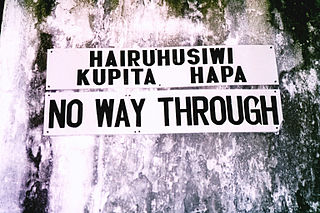Related Research Articles

Swahili, also known by its local name Kiswahili, is a Bantu language originally spoken by the Swahili people, who are found primarily in Tanzania, Kenya, and Mozambique. Estimates of the number of Swahili speakers, including both native and second-language speakers, vary widely. They generally range from 60 million to 150 million; with most of its native speakers residing in Tanzania.
Tanzanian Hip-hop, which is sometimes referred to Bongo Flava by many outside of Tanzania's hip hop community, encompasses a large variety of different sounds, but it is particularly known for heavy synth riffs and an incorporation of Tanzanian pop.
The Gusii language is a Bantu language spoken in Kisii and Nyamira counties in Nyanza Kenya, whose headquarters is Kisii Town,. It is spoken natively by 2.2 million people, mostly among the Abagusii. Ekegusii has only two dialects: The Rogoro (upper-side) and Maate (lower-side) dialects. Phonologically, they differ in the articulation of /t/. Most of the variations existing between the two dialects are lexical. The two dialects can refer to the same object or thing using different terms. An example of this is the word for cat. While one dialect calls a cat ekemoni, the other calls it ekebusi . Another illustrating example can be found in the word for sandals. While the Rogoro word for sandals is chisiripasi , the Maate dialect word is chitaratara . Many more lexical differences manifest in the language. The Maate dialect is spoken in Tabaka and Bogirango. Most of the other regions use the Rogoro dialect, which is also the standard dialect of Ekegusii.

In Uganda the most spoken language in the capital city is Luganda, followed by English, as all schools in Uganda use it in their studies due to the introduction of English during the colonial period. English is also the language of business and judicial matters. Most spoken after Luganda and English is Swahili. This language is more common in neighbouring Kenya and Tanzania. Swahili is taught in schools as an optional additional language and it is mostly spoken by the Ugandan army. In 2005, there were talks to include Swahili as the second official language as it was seen as neutral, however this is still not ratified by the government. Swahili is used among some communities bordering South Sudan and Kenya.
Gogo is a Bantu language spoken by the Gogo people of Dodoma Region in Tanzania. The language is spoken throughout Dodoma Region and into the neighbouring district of Manyoni.
The Zinza are Bantu ethnolinguistic group from the southwestern Islands on Lake Victoria, Tanzania. The Zinza people also lived on the shores of Geita Region's Chato District and Geita District and Mwanza Region. In 1987, the Zinza population was estimated to be 138,000.
The Sumbwa are Bantu group native to Bukombe District, Geita Region in central Tanzania. In 1987 the Sumbwa population was estimated to be 191,000. Sumbwa is a tribe that has had its own traditions and good practices. One of their traditional dance is mulekule.
Gweno is a Bantu language spoken in the North Pare Mountains in the Kilimanjaro Region of Tanzania. The people known as the Gweno are a Chaga ethnic and linguistic group. Since the Chaga people are Bantu speakers, the adopted language contains dialects similar to that of the Kenyan language Kamba. Gweno shares about 54% to 56% of its vocabulary with other Chaga dialects and 46% with Taita dialects. However, a large percentage of its vocabulary is not seen in the other dialects. Also at the start of the 11th century, the Chaga people descended and migrated from the Bantu group in which they migrated to the foothills of mount Kilimanjaro. The Gweno language is today spoken mostly by older adults, with younger generations having shifted to Asu and Swahili. Ethnologue considers Gweno to be moribund; the language is not being passed down because children have not been exposed to Gweno since the 1970s. The generational shift from Gweno to either Asu or Swahili has certainly created shifts in dialect, however Gweno speakers do not see this as a threat.
Baraza la Kiswahili la Taifa is a Tanzanian institution responsible with regulating and promoting the Kiswahili language.

The Swahili Wikipedia is the Swahili language edition of Wikipedia. It is the largest edition of Wikipedia in a Niger–Congo or Nilo-Saharan language, followed by the Yoruba Wikipedia.

State University of Zanzibar (SUZA) is a public university located in Mbweni ward of Mjini District in Mjini Mgaharibi Region of Unguja Island in Zanzibar, Tanzania. The university was established by an act of House of Representatives of Zanzibar in 1999 and became operational in 2002.
Swahilization or Swahilisation refers to one of two practices:
Chama cha Kiswahili cha Taifa is a Kenyan institution founded in 1998 responsible for the promotion of the Swahili language in Kenya. The Founding Chair is Prof. Kimani Njogu, a graduate of Yale University's department of Linguistics.

Tanzania is a multilingual country. There are many languages spoken in the country, none of which is spoken natively by a majority or a large plurality of the population. Swahili and English, the latter being inherited from colonial rule, are widely spoken as lingua francas. They serve as working languages in the country, with Swahili being the official national language. There are more speakers of Swahili than English in Tanzania.
Mochi is a Bantu language spoken in Tanzania. It is the prestige language of the Chaga people.
Zinza (Dzinda) is a Bantu language of Tanzania, spoken on the southern shore of Lake Victoria.
Ikizu is a Bantu language spoken by the Ikizu peoples of Tanzania. Its dialects are Ikizu proper and Sizaki. Maho (2009) treats Sizaki (Shashi) as a separate language. However, Ethnologue 16th edition retired the ISO code for Sizaki, merging it into Ikizu.

Mathias E. Mnyampala (1917–1969) was a Tanzanian writer, lawyer, and poet. Mnyampala was born on 18 Novembern 1917 according to a personal record form but he wrote in his autobiography, Maisha ni kugharimia, that he only knew the year with accuracy. He was born in the hamlet of Muntundya depending on the village of Ihumwa in Chamwino District in Dodoma region at the time part of German East Africa. He died on 8 June 1969 in Dodoma city, Tanzania. Mnyampala wrote in Swahili, the lingua franca of East Africa, not Cigogo, the native language of his ethnic group.
Taasisi ya Taaluma za Kiswahili, known by its acronym TATAKI, is a research body dedicated to the research of the Kiswahili language and literature at the University of Dar es Salaam in Tanzania.
World Swahili Language Day is observed annually on 7 July. This began when UNESCO declared 7 July as Swahili Language Day in 2022. On 7 July 1954, Tanganyika African National Union (TANU) leader Julius Kambarage Nyerere, the future first president of Tanzania, adopted the Swahili language as a unifying language for African independence struggles. Jomo Kenyatta, the first president of Kenya, followed suit and also used the Swahili language to mobilize and unify the people of Kenya in the struggle against colonialism through the use of the popular "Harambee" slogan.
References
- ↑ Kahe at Ethnologue (18th ed., 2015) (subscription required)
- ↑ Jouni Filip Maho, 2009. New Updated Guthrie List Online
- ↑ Kahigi, Kulikoyela K. (2008). Kikahe: Msamiati wa Kikahe-Kiswahili-Kiingereza na Kiingereza-Kikahe-Kiswahili (Kahe–Swahili–English and English–Kahe–Swahili Lexicon). Languages of Tanzania Project. ISBN 9987-691-15-3.
- ↑ Muzale, H. & Rugemalira, J. (2008). Researching and Documenting the Languages of Tanzania. LOT Project, University of Dar es Salaam